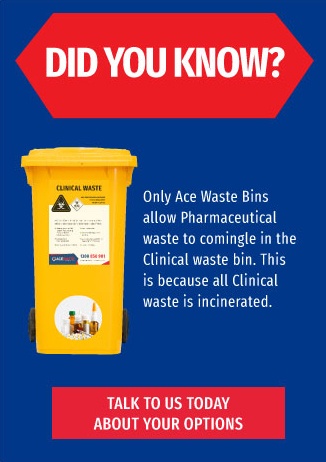The nursing home and care system in Australia is associated with its fair share of challenges, which can only be exacerbated by external factors. This includes a rapidly ageing population and the ever-present shadow of the COVID virus. Whilst it may not always seem the most pressing of issues, waste management is a critical component in the effective delivery of residential care.
This article addresses the responsibilities of nursing home providers in waste management and how professional waste disposal and collection services may best assist this process.
Nursing home Standards and Waste Management
Nursing home facilities have a duty of care to ensure their residents experience a high quality of life. Residents should be met with conditions that are safe, comfortable and dignified. These institutions also have a wider range of responsibilities that take into account the surrounding community and the environment at large.
Nursing Home Quality Standards in Australia
In Australia, aged care standards are governed by the Australian Government Aged Care Quality and Safety Commission. Their quality standards fact sheet details that “Each consumer gets safe and effective personal care, clinical care, or both personal care and clinical care, that:
- Is best practice;
- Tailored to their needs; and
- Optimises their health and well-being.”
The fact sheet also addresses the minimisation of infection-related risks “through implementing standard and transmission-based precautions to prevent and control infection.”
Design Guidelines for Queensland Residential Care Facilities
As a part of the Commonwealth Aged Care Act 1997, the Design Guidelines for Queensland Residential Aged Care Facilities (download as PDF) is an important document detailing care standards from the perspective of facility design and provisions. It is also a prominent example of nursing homes’ typical responsibilities in waste management.
In relation to waste disposal and waste management overall, the document provides instruction on the delivery of Clinical Services and Cleaning, prescribing that care workers must:
- Allow space for disposal of waste products cleaning/equipment, sanitising equipment and the storage of soiled linen trolleys.
- Provide dirty utility room and facilities for cleaning and storage of sanitary containers, including bed pans, bottles, sanitary containers, etc.
- Provide vermin-proof containers for refuse disposal.
- Provide adequate cleaning machines and accessories, manual cleaning tools and cleaning agents.
- Provide cleaning and hygiene consumables.
- Arrange necessary storage and disposal measures for refuse collected from the facility.
LEARN OUR AGED CARE WASTE MANAGEMENT
Challenges in Waste Management for the Care Sector
From the previous section, you can see the high importance placed on aspects of nursing home waste management. This is particularly in terms of:
- Personal/clinical care;
- Infection control; and
- Correct protocols in waste handling/disposal (including using the right equipment and methods).
Where there is a concern that regulated protocols in waste management aren’t being met or adequately addressed by care providers, a failure on this account can often stem from improper waste identification leading to incorrect (and unlawful) waste segregation. Sometimes it is the case that the personnel responsible for waste management don’t always get the waste segregation component of their job right. There can be a variety of factors behind this. We explore these issues, as follows.
Complexities in waste terminologies can impact waste segregation
An individual’s understanding of various waste streams will often depend on where they live or where the organisation they work for is based. For example, what’s known as Clinical Waste in Queensland becomes Medical Waste in Victoria. This can be confusing, especially given that the terms “Clinical Waste” and “Medical Waste” refer to the exact same types of waste items, by-products and remnants.
What is Clinical Waste?
In all practicality, what is Clinical Waste? Clinical waste (which we now know is the same as Medical Waste) is defined as waste that has the potential to cause disease, including, for example, the following — (a) animal waste (b) discarded sharps (c) human tissue waste (d) laboratory waste.
Clinical waste must be treated before it can be disposed of in landfill. Because of the potential risk associated with exposure to Clinical Waste, the only appropriate treatment method that can currently be used is high-temperature incineration. This type of disposal can only be guaranteed via the services of a professional waste management company, such as the team at Ace Waste.
As you might expect, there is a lot more to know about
Clinical Waste Disposal than meets the eye. You should also keep in mind that this is merely one of the many commonly identifiable waste streams (each with its own specific inclusions and protocols).
LEARN OUR CLINICAL WASTE SOLUTIONS
Managing infection risks
In the case of Clinical Waste, the infection risk is evident. If disposed of incorrectly, Clinical Waste is just one waste type that has the potential to cause wholesale public health problems and widespread ecological disaster. There are many harmful effects that can arise due to the incorrect disposal of waste. With the world currently in the grip of a pandemic, this threat becomes manifold.
Those tasked with waste disposal duties must be able to understand which terminologies are applicable to their region so that they are able to apply effective waste management protocols. Should they be at any risk of failing to achieve this, this important responsibility should be passed on to a professional waste disposal company.
Abrupt changes in waste classifications can leave providers ill-prepared
In recent times, the spread of COVID-19 has impacted both the health and waste industries, as well as many aspects of everyday life. The pandemic has precipitated an even more pressing need for well-planned and implemented nursing home waste management.
In Victoria, all nursing homes with positive cases of coronavirus have been directed to classify all their waste as Medical Waste. As we have seen, medical waste is an interchangeable term for clinical waste applied on a state-specific basis.
Waste in times of COVID-19
The reason for this is explained in this article from the ABC. The article functions as a case study of how waste classification is subject to not only unprecedented change but to dramatic and unexpected shifts. This is especially where external factors are involved.
The article also shows how nursing home providers’ current management systems may be insufficient in dealing with a massive spike in waste production due to COVID-19. In other words, all those extra gowns, gloves and masks. On this topic, have you ever wondered where COVID-19 waste goes?
In the incident described in the article, a profuse amount of used personal protective equipment (PPE) and other waste was uncontained by a Victorian nursing home and was left exposed on the footpath. We are talking about a facility that, at the time, had more than 100 confirmed cases of coronavirus. Unsurprisingly, a great many people expressed concern that this spillage would transmit COVID-19 in their community.
The value of having a solid Nursing Home Waste Management Plan
What we can take from this is that aged care providers should be increasingly proactive (and far less reactive) in their approach to waste disposal/waste management, especially when it comes to Clinical/Medical Waste.
In achieving this, the value of a professional Waste Management Plan is clear. This is essentially a roadmap for managing your waste, as uniquely tailored to your business. When you use the services of our experienced team at Ace Waste, your Waste Management Plan is guided by the results of a comprehensive Waste Audit.
A Waste Audit will highlight where your current systems and processes in waste management are lacking/could be improved. This is to help you be prepared for any unprecedented situations, ie. a ‘waste emergency’. Waste Audits also function to help you reduce costs, achieve compliance and also enhance your environmental sustainability.
Nursing home facilities may be under-resourced in their waste management capabilities
Dealing with waste incorrectly often poses harm to both humans and the environment. Effective protocols in handling, transporting and disposing of medical/clinical waste (and all other waste types) must be sustained by nursing home facilities. Naturally, there are severe penalties for those found to be non-compliant in meeting waste regulations.
As demonstrated above, there are significant challenges that surround effective waste management for nursing homes. These challenges can be exacerbated when waste disposal responsibilities are managed by organisations solely in-house. It is common enough and unfortunate enough occurrence that staff may simply lack the resources required to adequately carry out their waste-related duties. This can include proper education and guidance, as well as the correct equipment, PPE etc.
Benefits in delegating waste management duties
In contracting a professional and reputable waste management company, aged care facilities can overcome challenges in waste handling, waste transportation and, of course, waste disposal. In doing so, they can meet their core requirements in patient care.
They are also able to meet their wider responsibilities (in both a public health and ecological sense). This includes the central tenets of care for nursing home, mentioned earlier in this article. For those who work in nursing homes, retirement homes and related facilities, this can comes as a significant relief.
Employees who work in these organisations are usually kept very busy by quite a taxing daily schedule. Imagine trying to carve out the time, energy and acumen to devote to effective waste disposal, on top of everything else! At Ace Waste, we recognise this and are passionate about taking weight off the shoulders of nursing home personnel, giving peace of mind, and helping in the delivery of waste-related services to our elderly Australians.
How Ace Waste looks at the bigger picture in nursing home waste management
At Ace Waste, we have a commitment to providing dignified and compassionate care. This incorporates our waste disposal products and services, aimed at supporting the most important objectives in care for the elderly. As aforementioned, our Waste Management Plans (derived from the conclusive findings of Waste Audits) form a proactive approach to waste disposal compliance.
We can provide almost any waste solution so you won’t be left unprepared at any stage. This includes our provision of waste containers (including sharps containers) for nursing homes and aged care facilities across Australia. Our options are discrete and hygienic. Of course, they are also 100% safe and secure.
Effective waste disposal or waste management has a central role in ensuring that the elderly person’s needs in health, hygiene, comfort and quality of life are well provided for. Ace Waste will work with your nursing home employees and management to deliver effective and compliant waste management.
DISCOVER MORE ABOUT OUR WASTE DISPOSAL SERVICES
Are you a nursing home provider in Australia requiring waste disposal and other waste services? Ace Waste is experienced and equipped to help you in delivering effective and compliant waste disposal and can help you plan for the future. Call our friendly and knowledgeable team on 1300 850 901 or request a quote today.











